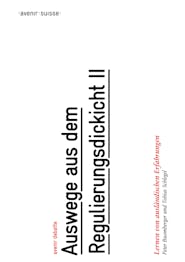Regulation – especially its steady rise – has been in the public eye for some time. But repeated attempts to combat the torrents of red tape have not had much success so far. For Avenir Suisse‘s latest publication – the second on the subject – Peter Buomberger and Tobias Schlegel have looked outside the country for more promising efforts. Their recommendations for Switzerland include “one in, one out” rules, fixed expiry dates for laws, more perspective when adopting international standards, considering zero based regulation and a macroeconomic “regulatory brake.”
Everyone is talking about excessive regulation. In the past 10 years, there have been more than 100 different motions in the Swiss parliament aimed at deregulation and cutting bureaucracy, but they have not borne fruit. Rather, the opposite: the regulatory jungle has actually thickened. While the odd rule has been abolished, others – like Medusa’s head – have grown back elsewhere. According to estimates, the cost today of bureaucracy on companies amounts to up to 10% of GDP. The costs in terms of growth foregone must be substantially higher. There are many reasons for the expanding regulatory jungle: international rules that are often adopted without thinking, civil service activism, corporate lobbying, as well as a general rise in demands on the state. On an individual basis, the measures often seem sensible. But, in combination, they can have a paralysing effect – hence the so called “Gulliver Syndrome.”.
Avenir Suisse’s new “avenir debate” publication by Peter Buomberger and Tobias Schlegel shows a significant reduction in regulation is possible. The Netherlands, Britain and Germany are much more advanced in this area than Switzerland. They have clearly defined goals, standardised cost assessments and independent evaluating bodies. The following measures should be considered for Switzerland:
- One in, one out rules that look at sectors of the economy on an individual basis. For every new law, an old one should be abolished. Britain and Canada have already seen early successes with this policy. To exclude turf wars, it should be applied only within a specific regulatory area.
- An expiry date for new laws. This step was introduced in the US under the name “Sunset-Clause.” It requires laws to be re-evaluated before an expiry date.
- Opting out of international regulations. Globalisation has led to greater international co-ordination. But it doesn’t make much sense to burden start-ups or small and medium sized businesses focused on the domestic market with extra rules. Wherever possible, they should be offered the possibility of opting out.
- Zero based regulation for new technologies. There is the danger that outdated regulations could impede disruptive innovations or new companies’ market access. As with “zero based budgeting”, “zero based regulation” could be implemented, whereby all existing rules in a given sector would be replaced by a new regulatory framework.
- Better governance structures in the regulatory process. It is important to keep the regulatory process on track from the start, as the possibility for changes after the parliamentary stage is limited. This could be achieved through an early “quality check” and a later deeper evaluation, with both stages being conducted by an independent evaluation body.
- A macroeconomic “regulatory brake” setting an upper limit. As mentioned, the absolute numbers of regulations is a problem, as there is a multiplier effect. What would be sensible would be a one off reduction target (for example 25%), followed by the introduction of a legally binding “regulatory brake” freezing regulatory costs at a given level.
At a time when Swiss companies are particularly burdened by the strong franc and global growth prospects have dimmed, a radical reduction in regulations could be an important signal, boosting confidence in the domestic economy. But what will count in the end is the political will. Experience abroad has shown that too.





